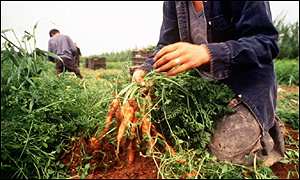
GM crop trials on a west Wales farm have been postponed indefinitely.
Owners of the farm at Mathry in Pembrokeshire have called off the tests on two fields because of fears raised over the value of their crop.
Contractors said it would be unfair to proceed with the maize trials, which were planned for Friday, on Castle Cenlas Farm.
The scheduled tests had been met with over 100 demonstrators concerned about cross-pollination in a protest on Monday, but trials are still going ahead on a farm at Sealand in Flintshire, where GM seed was sown on Saturday.
A statement from contractors Raymond Bros and farm owner Tony Marlow, a former Conservative MP, blamed “a deceitful and distorted campaign of misinformation.”
It claimed farmers had been “wrongly led to believe that the value of their commercial crops and livestock products would be put at risk by proceeding with the trial of GM maize.
“The Government has woefully failed to provide, with Cabinet Minister Mo Mowlem giving every encouragement while Michael Meacher has done all he can to undermine the scheme.”
Protestors had called on UK Environment Minister Mr Meacher to halt the trials after he questioned the location of a GM test site in Warwickshire.
Decision welcomed
Welsh Rural Affairs Minister Carwyn Jones said he warmly welcomed the suspension. He said he was heartened that the views of people in Pembrokeshire led to a change of heart.
Mr Jones vowed the Welsh Assembly would impose greater distances between GM and organic crops in future.
The other political parties in Wales all backed the postponement. Liberal Democrat agriculture spokesman Mick Bates said the decision called into question the validity of the Flintshire trial.
Peaceful protestors had been planning a legal injunction against the proposed tests in Pembrokeshire and had been staging fundraising events to finance a barrister.
Mr Marlow had listened to their concerns, but had previously been determined to go ahead with the planting of fodder maize.
Farmer John Cottle was also standing firm on his belief the trials on his Birchenfield Farm at Sealand were necessary and would prove harmless.
Mr Cottle was met with almost 40 placard-waving villagers when he planted the genetically-modified seed on the weekend.